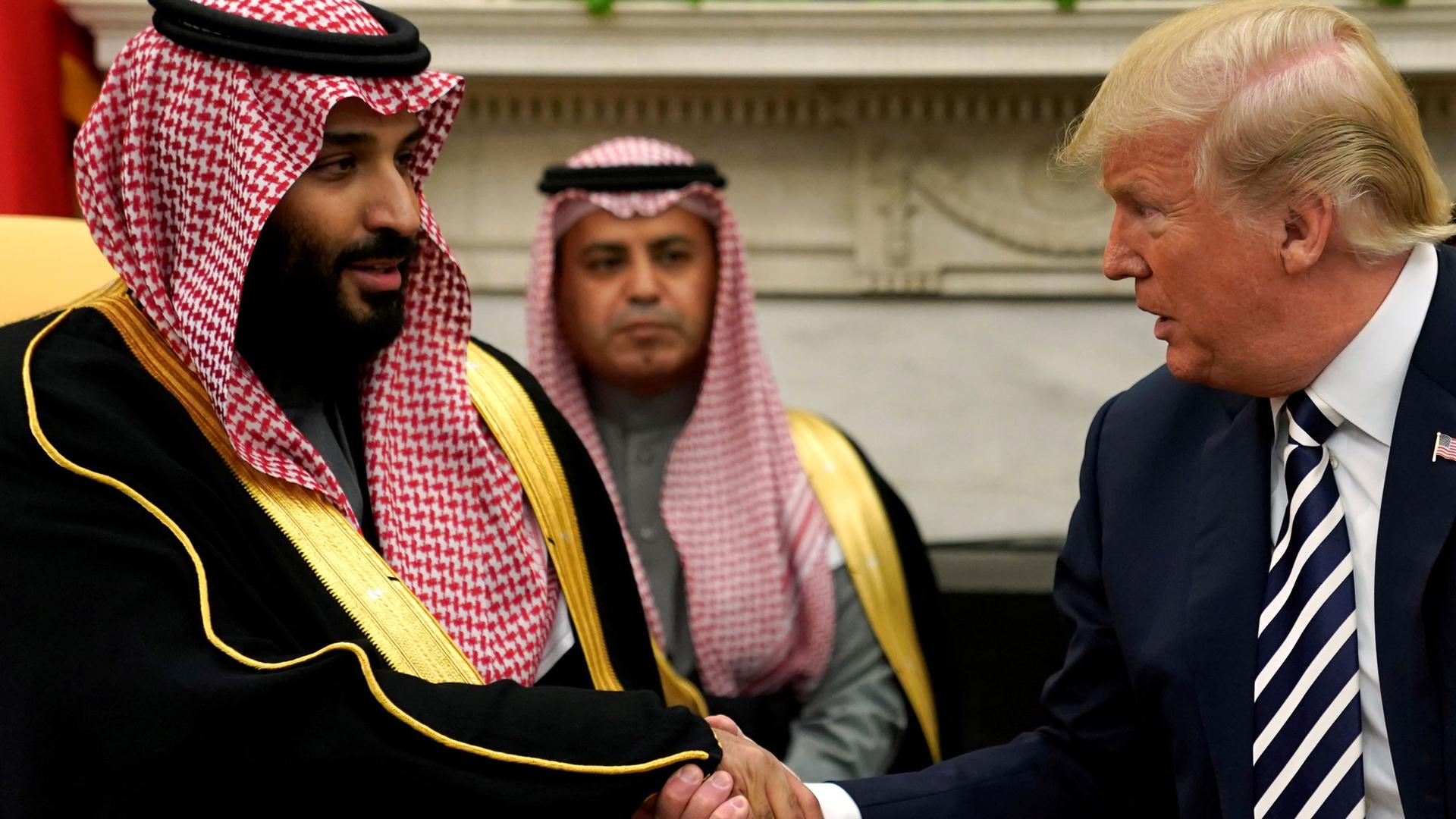Trump maintains business as usual with Saudis
US President Donald Trump shakes hands with Saudi Arabia’s Crown Prince Mohammed bin Salman in the Oval Office, March, 2018.
Leaders in Riyadh and Washington have been strong business partners since Franklin D. Roosevelt cut an oil deal with King Abdulaziz bin Abd al-Rahman al-Saud in 1945. Following the murder of journalist Jamal Khashoggi last month, President Donald Trump has pledged to protect that relationship, preserving cordial relations with Saud’s grandson, Mohammed bin Salman, the Saudi Crown Prince.
But there is backlash underway. Germany has announced, in light of the scandal surrounding the Khashoggi murder, that it is putting all weapons sales to Saudi Arabia on hold.
When Trump spoke to reporters Tuesday, he talked about the “hundreds of billions of dollars in orders” from Saudis to American companies. And he translated that into US jobs — hundreds of thousands, he said. Last month, Trump said that cutting off ties with Saudi Arabia would cost America jobs — lots of them.
“600,000 jobs; maybe more than that. And it would be very hurtful to this country if we said, ‘Oh, we’re not going to sell it to you,’” he told reporters on Oct. 19.
But 600,000 is likely an overstatement. Some experts count the number of US jobs dependent on Saudi Arabia as much, much lower.
“I don’t think the president knows how many jobs are connected with arms sales to Saudi Arabia,” says William D. Hartung, director of the Arms and Security Project at the Center for International Policy. “He said there’s a million jobs, 500,000 jobs. When he met with Mohammed bin Salman in the White House he had a chart that said 40,000 jobs. My estimate is it could be half of that.”
Hartung, whose new report examines US-Saudi defense deals, says Saudi-funded defense work employs less than 0.03 percent of the US labor force.
“If you look at sales to Saudi Arabia in terms of deliveries that happen every year,” he says, “that’s about $2.5 billion a year, a couple of percentage points of what the Pentagon spends on weapons.”
The Saudis buy all kinds of military hardware from the US. F-15 fighter jets from Boeing, helicopters from Boeing and Sikorsky, combat ships from Lockheed Martin, laser-guided bombs from Raytheon. These are just the big-ticket items.
Donald Trump’s statement suggested that if US companies were to stop selling to the Saudis, then China and Russia would fill the void. And that is without a doubt true. But in the short term, says Hartung, replacing US weapons systems would be very, very difficult for the Saudi military.
“Two-thirds of their air force comes from the United States,” he says. “They have thousands of armored vehicles and tens of thousands of bombs from the United States. All those need support.”
Saudi Arabia may need the US more than the United States needs the Saudi Kingdom.
While the president correctly says Saudi cash produces US jobs, the number of jobs is in the tens of thousands — not the hundreds of thousands that Donald Trump has claimed.
Were the US to stop weapons production for Saudi Arabia, the pinch would be felt in a few production centers, such as St. Louis, where F-15 fighter jets are still being made and Tucson, Arizona, home of Raytheon’s largest bomb and rocket factory. A freeze on Saudi weapons sales could halt production there, but Hartung believes employees would likely be reassigned to other work.
“In Tucson, for Raytheon, they’re building bombs for all the different US conflicts that are going on, selling to the Pentagon,” says Hartung. “So, a setback on their sales to Saudi Arabia would be more of a hiccup for them.”
In contrast to Angela Merkel’s hold on weapons deliveries to Riyadh, the Trump Administration has shown no sign that it intends to disrupt the flow of US weapons to the Saudi Kingdom. Since the murder of Jamal Khashoggi on Oct. 2, the Department of Defense has announced five new defense contracts with Saudi Arabia. The most recent one was on Monday, Nov. 20.
Our coverage reaches millions each week, but only a small fraction of listeners contribute to sustain our program. We still need 224 more people to donate $100 or $10/monthly to unlock our $67,000 match. Will you help us get there today?
